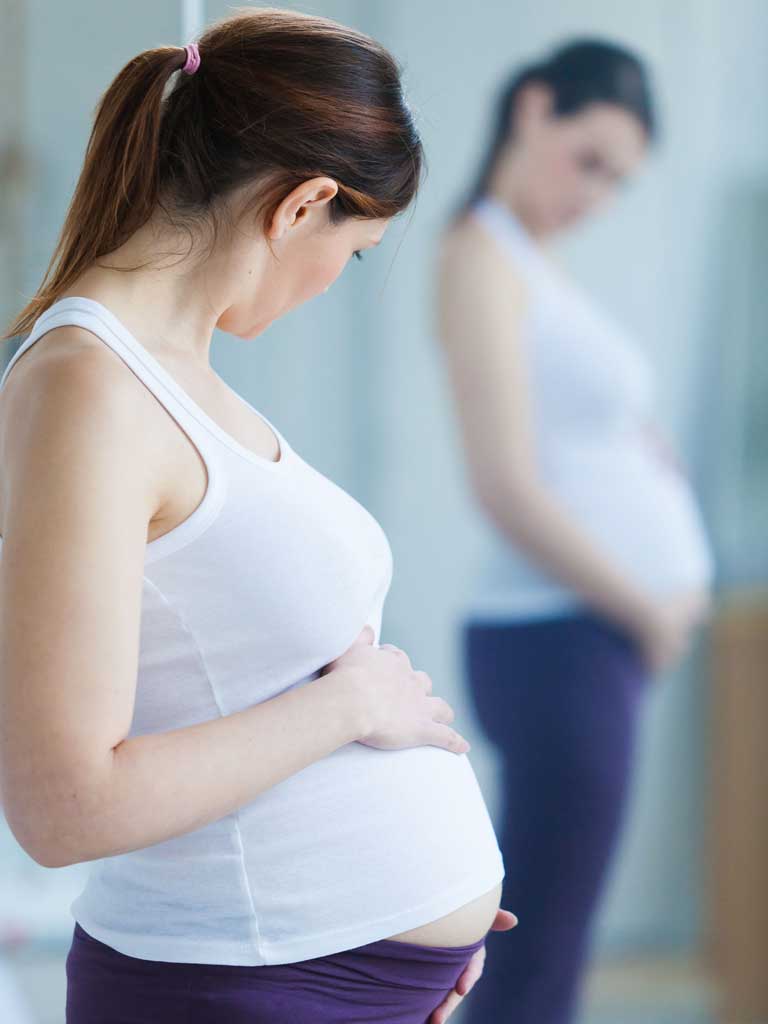Now dieting in pregnancy is good for you
Study finds losing weight benefits mother and child, overturning decades of advice

Eating for two should be a thing of the past for pregnant women after research suggested that dieting during pregnancy could reduce complications for women and lead to healthier babies.
The risks of pre-eclampsia – which causes high blood pressure – diabetes and premature birth can all be reduced if the mother-to-be sticks to a healthy, calorie-controlled diet, the study published on bmj.com found.
In contrast, excessive weight gain in pregnancy was linked to a number of serious health problems. In the UK, more than half of women of reproductive age are said to be overweight or obese.
Up to 40 per cent of women gain more than the recommended amount of weight in pregnancy. Half the women in the UK who die during pregnancy, in childbirth or shortly after the birth are obese or overweight. Maternal obesity also increases the risk that the baby will become obese as a child.
The researchers who carried out the study, from Queen Mary, University of London, found that diet and exercise were effective in reducing weight gain in the mother. Dietary intervention produced the biggest average reduction in weight gain (almost 4kg) compared with 0.7kg for exercise and 1kg for a combination of the two.
Diet was also better at preventing pregnancy complications such as pre-eclampsia, gestational diabetes and premature birth, the study found.
The researchers analysed the results of 44 randomised controlled trials involving more than 7,000 women. Experts at St Thomas' Hospital in London suggested there was not yet enough evidence to support any particular intervention. Lucilla Poston, director of the maternal and fetal research unit, and Lucy Chappell, clinical senior lecturer in maternal and foetal medicine, said it would be "premature" for the National Institute for Health and Clinical Excellence to reassess its guidelines, which do not advise regular weighing of pregnant women.
Jane Brewin, head of the pregnancy research charity Tommy's, said: "As part of our work to educate women on the best lifestyle choices during pregnancy, we welcome this study and believe that there is growing evidence to re-evaluate current guidelines for weight management during pregnancy."
Dr Janine Stockdale, a research fellow at the Royal College of Midwives, also hailed the research, adding: "The researchers are not advising women to lose weight during pregnancy; this is about managing excessive weight or weight gain. If a woman is on target to gain the right amount of weight during her pregnancy, then 'dieting' and 'calorie controlled dieting' as we commonly understand [them], is not for her."
Doctor's orders: Pregnancy advice through the years
Alcohol
Pregnant women were once permitted, even encouraged, to drink alcohol by their doctors. Well into the 20th century, alcohol was viewed as an all-purpose remedy that soothed and fortified pregnant women.
In 1973 researchers at the University of Washington identified foetal alcohol syndrome, which affects the way the baby's brain develops, weakens its immune system and damages its organs. And in 1981 the Surgeon General of the United States warned pregnant women against the dangers of alcoholic drinks.
In May 2007, the Department of Health urged women to abstain completely from alcohol during pregnancy. The National Institute for Healthcare and Clinical Excellence, advises women not to drink any alcohol in the first three months because it can increase the risk of miscarriage.
Women are advised that if they choose to drink alcohol while they are pregnant they should consume no more than two UK units once or twice a week.
Smoking
Women began to smoke cigarettes in the 1920s, but did not smoke in large numbers until after the Second World War. The link between smoking and lung cancer was not established until 1956, when the British Doctors Study provided convincing statistical proof that tobacco smoking increased the risk of lung cancer. Pregnant women are advised not to smoke.
Peanuts
In August 2009, following a major review, the Government advised that there was no clear reason for pregnant or breastfeeding women to avoid peanuts unless they had an allergy. Previously they had been warned to avoid peanuts if there was a history of allergy in the child's immediate family.
Weight
Pregnant women were weighed at every check-up from the 1950s to the mid-1990s. This was dropped after evidence that weighing did not help to identify women at risk of pre-eclampsia
Sarah Cassidy
40%
Proportion of women who gain more weight than recommended in pregnancy.
Subscribe to Independent Premium to bookmark this article
Want to bookmark your favourite articles and stories to read or reference later? Start your Independent Premium subscription today.

Join our commenting forum
Join thought-provoking conversations, follow other Independent readers and see their replies